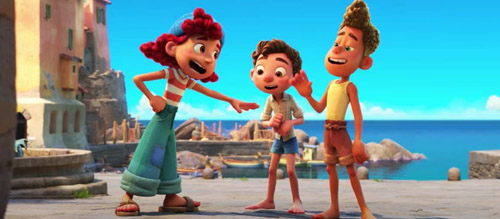Luca (2021) Review
Luca (2021)
Director: Enrico Casarosa
Screenwriters: Enrico Casarosa, Simon Stephenson, Jesse Andrews, Mike Jones
Starring: Jacob Tremblay, Jack Dylan Grazer, Emma Burman, Saverio Raimondo, Marco Barricelli, Maya Rudolph, Jim Gaffigan, Peter Sohn, Sandy Martin, Sacha Baron Cohen
Pixar have returned with their most summery and optimistic film in years. Luca might not be as thoughtfully metaphysical as the films directed by Pete Docter (Inside Out; Soul) or as perfectly formed as the Toy Story series, but it is still a gorgeous example of animation in its own right.
Young sea monster Luca (Jacob Tremblay) happily lives out his days tending his parents’ farm below the waves. That is until the day he meets the adventurous Alberto (Jack Dylan Grazer) who frequents the surface world magically disguised as a human boy. The two fast become friends and, after trying and failing to make a working Vespa from driftwood and scrap, soon make it to the quiet fishing town of Porto Rosso where they team up with intelligent outcast Giulia (Emma Burman) to win the local triathlon, all the while trying to keep what they really are a secret from the suspicious townsfolk.
The films of Studio Ghibli are a clear influence on Luca, from the town’s name Porto Rosso (one letter away from the similarly Mediterranean-set Porco Rosso) to Luca’s first sight of the world above the waterline being from a protective bubble, making him look a lot like the titular inquisitive goldfish princess in Ponyo. Another possible Ghibli reference is a very My Neighbours the Yamadas–styled mundane-meets-magical dream sequence of a Vespa flying through a luminous underwater fantasia. Another colourful fantasy sequence later on sees Luca and Giulia flying Da Vinci gliders around Saturn’s rings, Giulia’s (and later Luca’s) excited curiosity about the cosmos and director Enrico Casarosa’s previous Pixar short La Luna indicating that the protagonists of this filmmaker’s imagination share the same obsession as he does.
Also echoing Ghibli is the animation of some particularly appetising food. Training for the Porto Rosso triathlon makes up much of the film’s straightforward plot, our gang of three needing to practice swimming fast, cycling fast and eating pasta fast to come out on top (neither of the denizens of the deep can excel in their natural element lest they be exposed, so of course end up volunteering for the latter two events). Casarosa clearly enjoys gently ribbing his culture by embracing affectionate stereotypes of sleepy Italian towns – beautifully simple food, the laid-back lifestyle, assorted colloquial catchphrases – and you’ll likely never want to visit somewhere like this on a warm evening or eat cartoon pesto-covered linguine more.
You can’t really set a story in this kind of community without touching on the environmental impact of over-fishing. Luca’s parents (Maya Rudolph and Jim Gaffigan) are clearly very fearful of a new influx of fishing boats with motors disturbing their natural world, so want to send Luca to the farthest ocean depths with his creepy angler fish uncle Ugo (Sacha Baron Cohen), just as Luca is plucking up the courage to spend more time in the human world. Inevitably Luca’s parents find out where he has gone and set off in hot (well, wet) pursuit, providing the film’s final third with a little added tension. It could be argued that there is a dearth of tension in the film in general, that the laid-back summer holiday tone makes sure nothing really leaves a mark. There is a simple fantasy conceit to make sure you don’t get too relaxed though, that contact with any source of water reveals Luca and Alberto for what they really are. Mostly they can get by hiding in Porto Rosso, just avoiding the fountains and being careful on the fishing boats, but you can’t predict a particularly dewy early morning or a glass of water spilled at dinner.
We first meet Luca as he shepherds his family’s herd/shoal of fish across the sea floor, fish which of course have a sheep’s vacant stare, and who bleat. It’s this kind of throwaway non-sequitur gag, along with some icky stuff with his family’s many and varied fishy physical ailments and some good old-fashioned slapstick that keeps you chuckling throughout this wholesome story.
The main selling point of Luca aside from the pretty visuals is the warm and honest central friendship of Luca, Alberto and later Giulia. They are all outcasts in their own way, Luca dreaming of exploring a bigger world than his family approves of, Alberto wanting a surrogate family to replace a father who has seemingly abandoned him, and Giulia who is looking for friends to share her interests with. Kids of course get to pantomime boo Ercole (Saverio Raimondo), the local posturing bully and main rival to Giulia, and hearteningly also get to see a hugely positive representation of differently-abled people on screen in the form of Giulia’s dad Massimo (Marco Barricelli) who was born with one arm but is proven to be a very strong and capable fisherman as well as a talented cook – a man gruff and intimidating but as soft as mascarpone on the inside.
Luca doesn’t really shoot for anything grand or profound, but not all films have to. Sometimes you just want a modest and beautiful little story about a couple of sea monsters making a friend for life, cycling and eating pasta. The most lasting thing both children and adults can take away is a little mantra Alberto comes up with to quiet any self-doubts and encourage Luca to take a few more risks: “Silencio Bruno”, and we can all learn to take a moment and say that once in a while.
19/24


